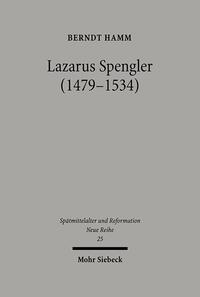
Using the town clerk of Nürnberg, Lazarus Spengler (1479-1534), as an example, Berndt Hamm examines the connection between humanism and Reformation, religiousness of the citizens and Christian faith, confession and politics, biblical standardization and public justification for laws. In ten studies, the author analyzes Spengler's social, cultural and Reformational surroundings as well as the man himself, for example Spengler as Dürer's friend and Luther's apologist, as one of the leading advocates and creators of the Reformation at the imperial level, as a representative, well versed in theology, of the lay element in the Reformation, as the person pulling the strings of a secret religious policy of the town clerks and as a pioneer in the creation of confession in the Reformation. For the first time, there is a text supplement containing an edited version of the Spengler book of family events from 1468 to 1570.